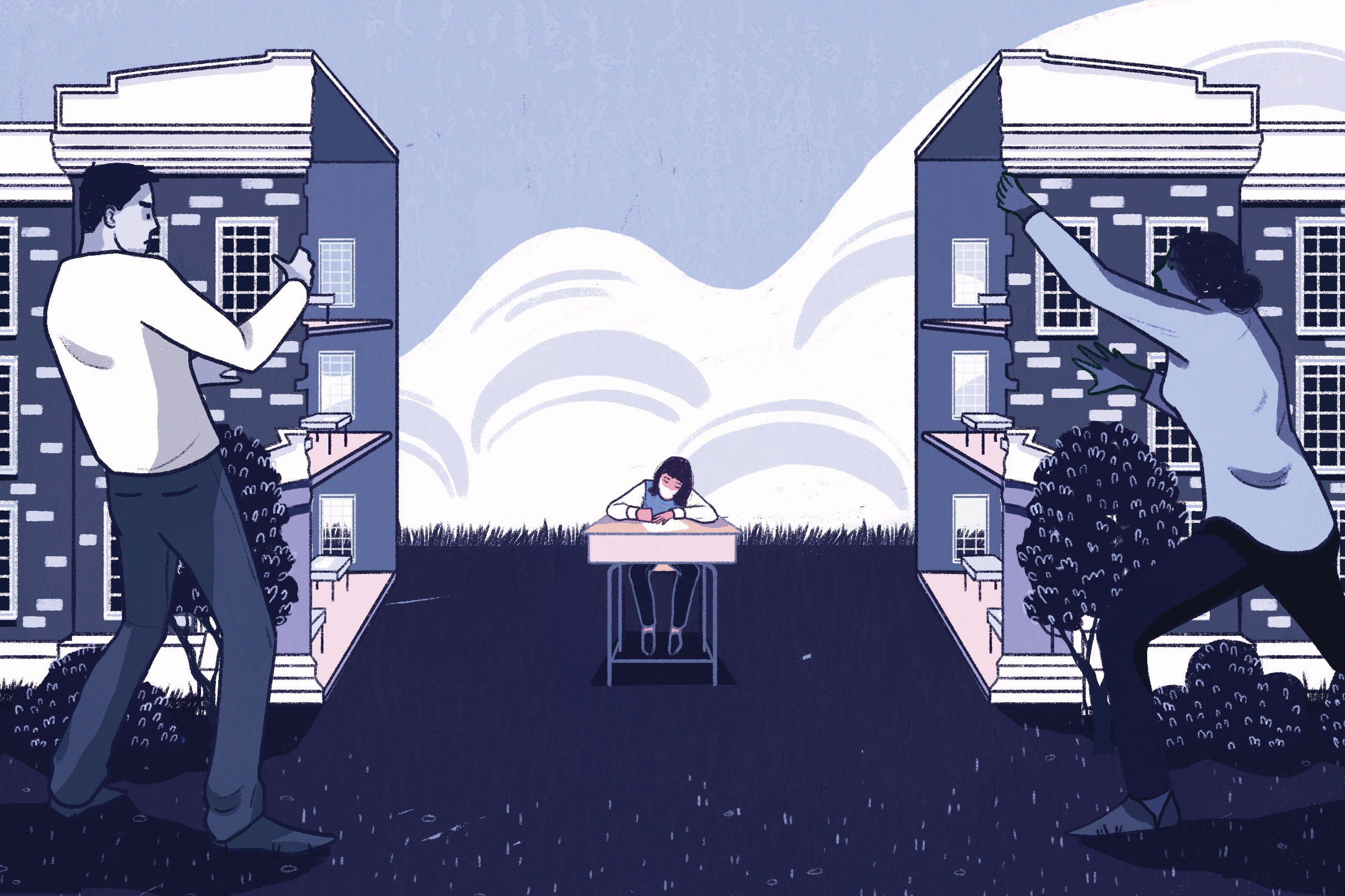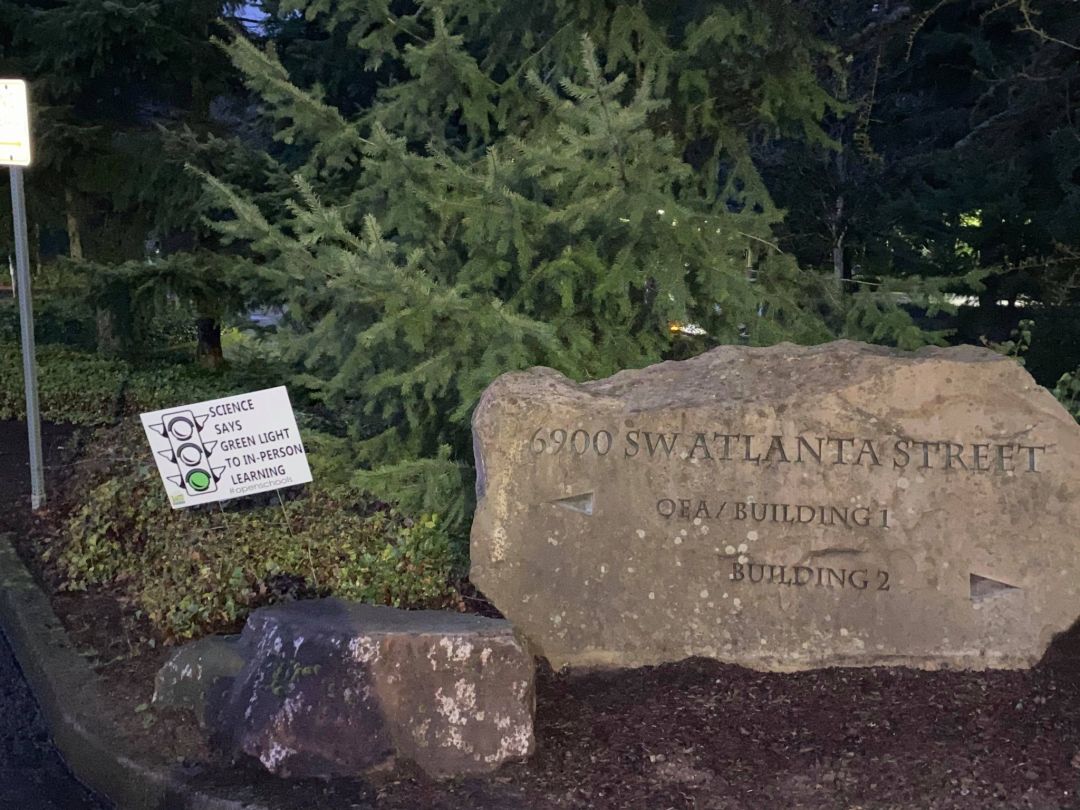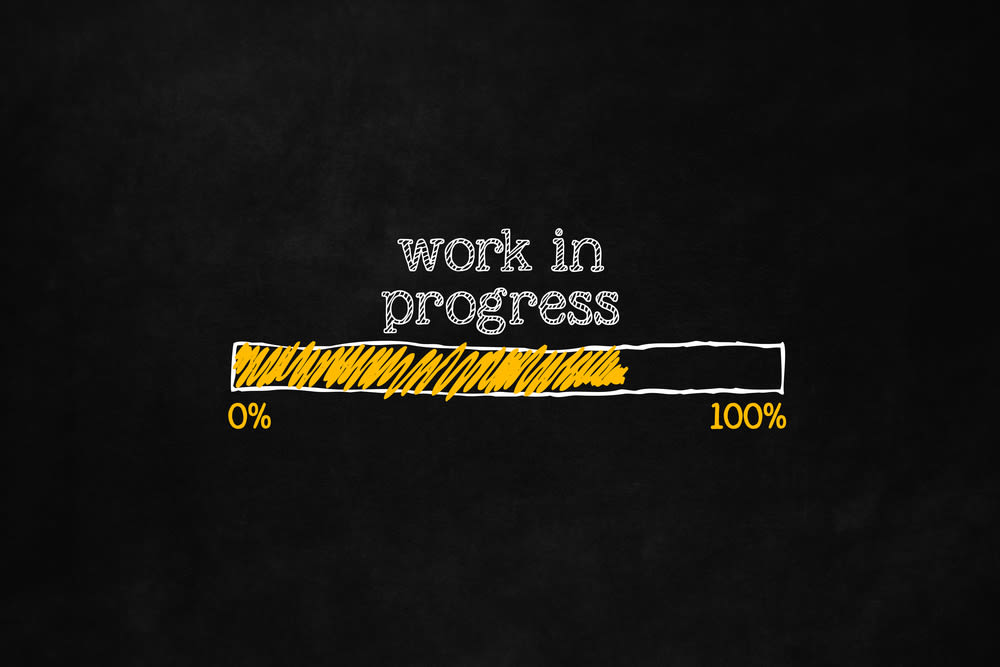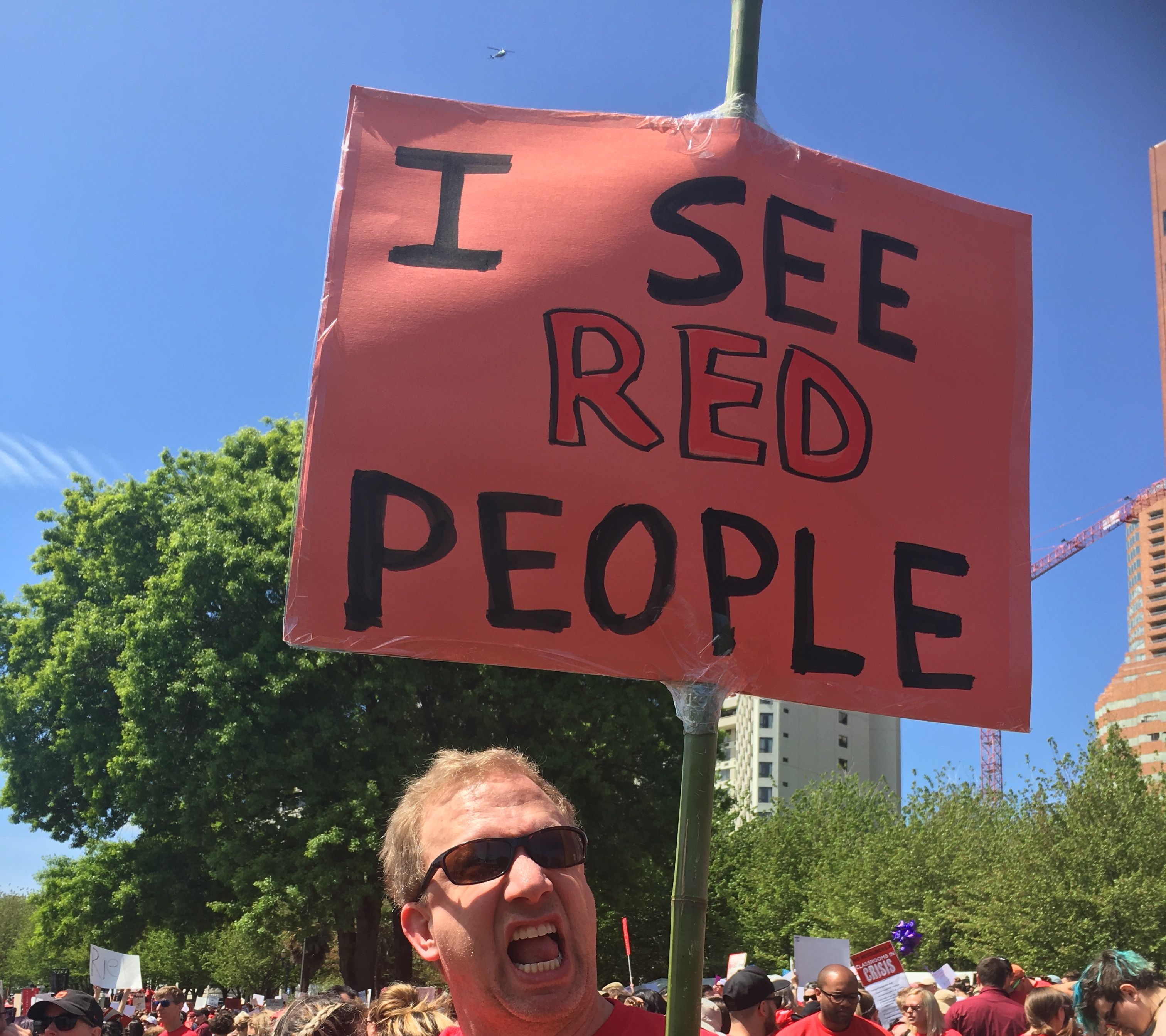
When ‘Back to School’ Becomes a Battle Cry
For a brief moment, back in the searing summer of 2020, there was momentum from the highest levels of state government to push all Oregon schools to at least partially reopen in fall of 2020.
“Can we encourage on-site education for younger students because of the data/evidence/research that shows they do not spread COVID-19 like older children do?” Gov. Kate Brown’s former chief of staff, Nik Blosser, who left for a job with President Biden's transition team, wondered during a July 21 meeting with Oregon Department of Education director Colt Gill.
The very next day, Oregon’s statewide teachers union threw its considerable weight behind guidelines requiring extremely low COVID case numbers before any school would be allowed to reopen. Brown would follow that lead within days, announcing a set of statewide school reopening metrics that ranked among the strictest in the nation. And so, last fall, while schools elsewhere in the world and the United States began opening, education in Oregon went virtually all virtual and stayed there.
Meanwhile, studies have piled up—like a January 2021 article for the Journal of the American Academy of Pediatrics in which researchers from Duke University tracked 11 school districts over nine weeks, open to 100,000 kids, and found “no incidence of child-to-adult transmission of SARS-CoV-2”—suggesting schools could open safely, so long as precautions were firmly in place. (Researchers at the Centers for Disease Control released new guidance on opening schools on February 12, underlining the importance of mitigations, but, crucially, not requiring teachers and staff to be vaccinated before reopening.)
But statewide and in Portland proper, transparency and urgency from school leaders about those precautions, including schedules for smaller classes, ventilation improvements, school-specific testing, and contact tracing programs, has been vague to nonexistent. After months of such uncertainty from the top, parents and teachers alike say they are losing faith, both in each other and in the public school system, an ominous sign for the future of the city and its children alike.
Historically, the Portland area has enjoyed substantial public school buy-in, more than some other major West Coast cities—89 percent of students in the metro area attend public schools, as opposed to 85 percent in the San Francisco area, according to 2019 data from the American Community Survey. School bonds and levies generally pass like clockwork here, by comfortable margins.
Civic-minded parents and teachers have long been in lockstep; when the Portland Association of Teachers in spring of 2019 put out the call for parents to join them on a “Red for Ed” march in support of more state school funding for smaller class sizes, more than 20,000 people showed up to Gov. Tom McCall Waterfront Park. (The following week, the state legislature voted in favor of new business taxes to generate $1 billion a year for schools.)
But the prolonged closure has shifted those long-standing alliances. Now, in private Facebook groups dedicated to reopening schools, in addition to crowd-sourcing data on successful openings from around the country to be used in email blasts to decision makers, there are parents accusing teachers of constantly slow-rolling and/or moving the reopening goalposts. (A purloined screenshot of a teacher detailing plans to teach from the car on a midday morning and then ski all afternoon drew such acerbic derision that moderators of the Opening PDX Schools group eventually pulled down the post.)
Other parents pointedly side with teachers and their worries over safety/logistics, skimming over concerns from kids and parents struggling at home with online learning expressed in social media forums for PPS parents. Some accuse the open schools crowd of using the fate of high-needs kids as a front for their real objective: getting their own kids back in the classroom.
There is evidence that academically, BIPOC kids are falling further behind their peers in Portland in virtual school; there is also national research that shows Black and Hispanic families, who’ve been hard-hit by coronavirus, are among those most reluctant to return to schools before full vaccination. Meanwhile, some local BIPOC parents say their kids are thriving in online learning, free from daily microaggressions in their classrooms and that they don’t trust public schools to keep their kids and their teachers safe from contracting the virus.
Teachers aren’t immune to the backbiting either—in internal union groups and on the invite-only Oregon for a Safe Return to Campus page, amid piercing and present fears of transmitting the virus to vulnerable family at home, some educators rail that parents who want schools to open simply see them as free babysitters. A top takeaway of the “teacher listening sessions” sponsored by the Oregon Department of Education this winter, attended by 700-plus educators, was that “some students are thriving in a virtual environment.”
"CDL is working for the majority of kids.... Things are going pretty well," Emily Markewitz, a third grade teacher at Vernon Elementary School, said during a recent bargaining session with district administrators. "We have the solution of LIPI [Editors’ note: Short for "limited in person learning," this is voluntary for educators and targeted at kids with the highest needs. Currently about one-half of 1 percent of the district's students are participating on an invite-only basis, though that number could grow] to meet the needs of kids for whom it is not going well. It doesn't make sense to do this to children at this point. The benefit—I don't see how that will outweigh the cost of disruption to their routine now."
Feedback to the Oregon PTA amounts to a 50–50 split between those who want a quick return and those who want to wait for vaccination for all, says president-elect Lisa Kensel, who has two children at Creston K–8 and one at Franklin High School.

Open schools advocates recently staged a rally at the headquarters of the Oregon Education Association, the state's umbrella teachers' union. They left one of their signs behind.
Image: Courtesy Opening PDX Schools
The divisions mask the real concern, Kensel says: “The focus at this time should not be on arguing about whether or not we should return to school, but instead discussing what the districts across the state are doing to prepare for the return to the building for staff, students, and families. Life stopped a year ago for a lot of people. Children need social and emotional support around that.”
If anything, teacher opposition to returning to school has only hardened in the face of the open-schools campaigns, especially after Brown’s January decision to move teachers to the front of the vaccine line, behind only health care workers and residents of long-term care homes, in hopes of opening more buildings. In response, leaders of the state’s five largest teacher unions said vaccines alone were not enough, raising concerns about transmission to their loved ones, and their students’ families, too.
More recently, the Portland Association of Teachers has asked for "intentional outreach and extensive feedback from families of color," before reopening plans are made, though the district has not broadly surveyed families since late July. A promised survey that was supposed to appear in in-boxes weeks ago was pushed back, then revamped to include only elementary school students. Middle and high school students and their families have been told they will have to wait for more information about a return to school, given "space constraints and more complex class schedule considerations."
Another unknown: Whether this week's announcement that restaurants and bars in the metro area can reopen for indoor dining will eventually result in an increase in a case rate that's been falling for months, dimming hopes that schools will open in the spring. Pile that on to another looming worry for families who’ve assumed that by September, school will be open again: With the achingly slow start to the vaccine rollout, and little clear sense of when a vaccine will be approved for children, some local administrators have begun to hint that full-time schools may not resume as normal in the fall.
Against this backdrop, some parents are decamping for private schools or moving out of the city entirely—after mostly increasing over the past 10 years, enrollment at Portland Public Schools dipped 3.4 percent overall this year, and 17 percent in kindergarten (though it is unknown whether those families are gone for good, or just waiting it out). Since Oregon doles out school money on a per-pupil basis, that could have long-term effects on school funding (and, by extension, teacher employment).
A PPS middle school educator who requested anonymity so her colleagues wouldn’t know she’d already pulled one child for Catholic school and was planning to send another next spring says the private school in question has been “flooded with applications. It’s going to have long-term consequences for PPS. A lot of people with money and resources are getting out.”
Toya Fick, the executive director of advocacy group Stand for Children, whose own first and fifth grader have been home from their public school since March, says the fate of the system keeps her up at night.
“If we could do it all over again, we should have treated schools like an essential service,” she says. “If Grocery Outlet and Target can figure out how to get us all in and out, why can’t we figure it out for schools? For the society, for the economy, for kids to learn and thrive, it is essential.”
Without a strong public school system, she says, you can’t grow the workforce a city needs to thrive, let alone attract new businesses and support existing ones. What’s more, she notes, unlike in cities including New York, Chicago and San Francisco, in Portland schools have been left to figure out their plans on their own, without help from local elected officials. When asked by Portland Monthly for comment on reopening schools, a spokesman for Mayor Ted Wheeler said he preferred to defer to “federal, state, and county guidance on all fronts COVID-related.”
“I wish there was in general more engagement in schools,” Fick says. “It is important, but local electeds have no budgetary authority and no jurisdiction over schools so there is little to no coordination. That is how Portland does. How is that working for kids or for our city? Could we, should we do this differently?”
Listen: Portland Monthly news editor Julia Silverman breaks down new guidelines for Oregon's school reopening efforts in this episode of Footnotes.




